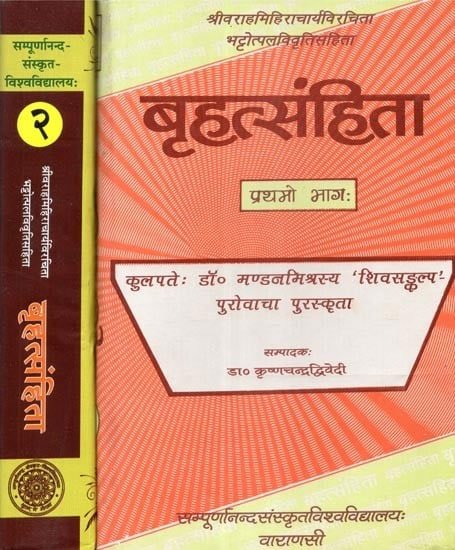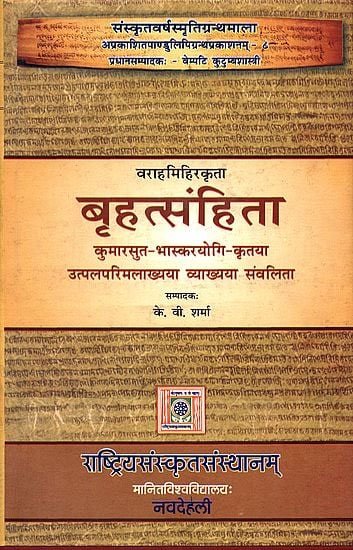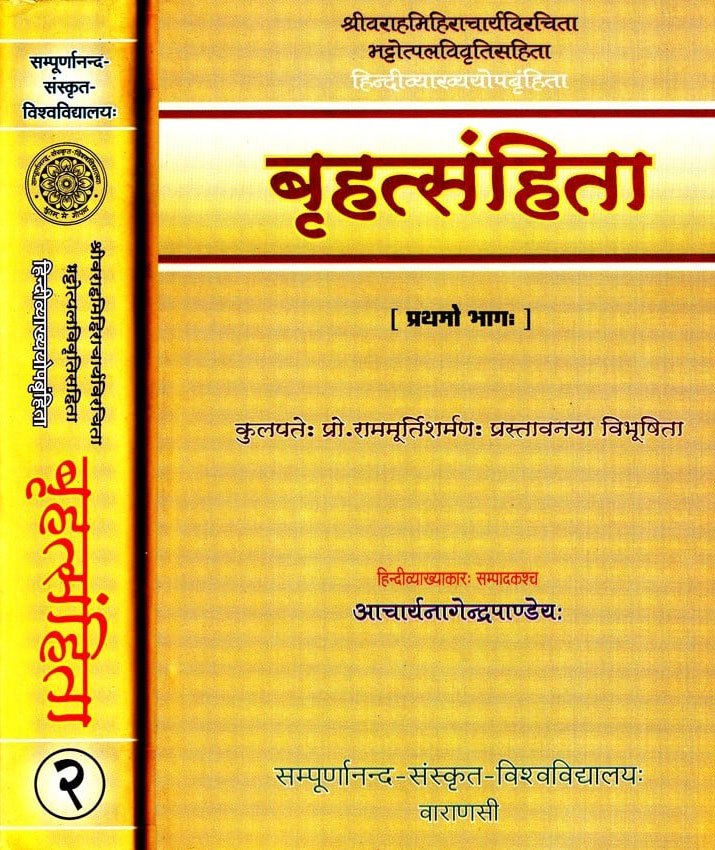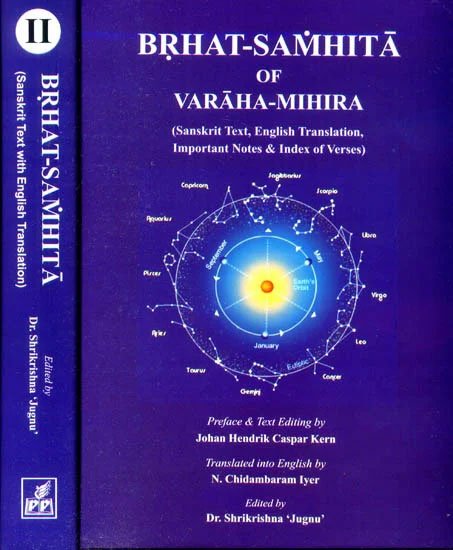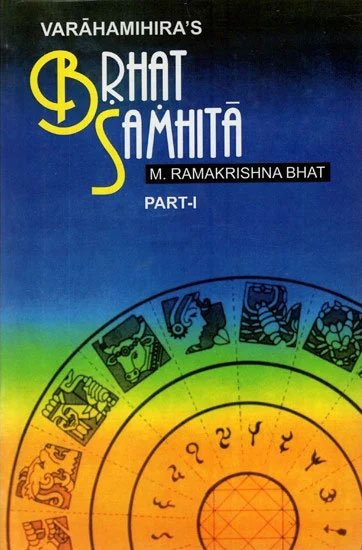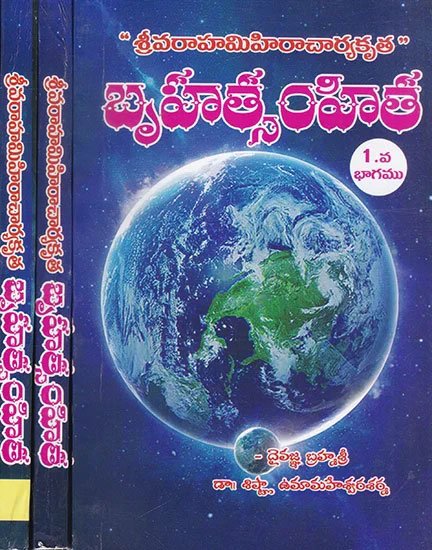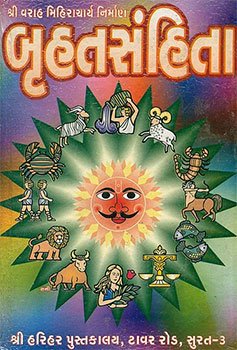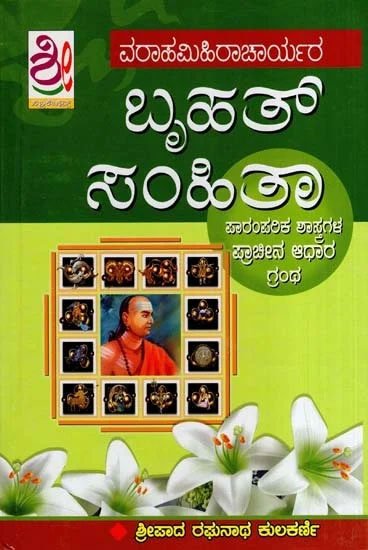Brihat-samhita [sanskrit]
26,560 words
The Sanskrit text of the Brihat-samhita from the 6th-century authored by Varaha Mihira in present-day Ujjain, India. It primarily deals with astrology and astronomy but is presented as an encyclopedia of knowledge.
Verse 65.5
षष्भिर्दन्तैः सिताभैर्भवति हयशिशुस्तैः कशायैर्द्विवर्षैः सन्दंशैर्मध्यमान्त्यैः पति समुदितैस्त्र्यब्धिपञ्चाब्दिकाश्वः ।
सन्दंशानुक्रमेण त्रिकपरिगणिताः कालिका पीतशुक्लाः काचा मक्षीकशङ्खावटचलनमतो दन्तपातं च विद्धि ॥ ५ ॥
[पतित । त्र्यब्द । माक्षीक]
ṣaṣbhirdantaiḥ sitābhairbhavati hayaśiśustaiḥ kaśāyairdvivarṣaiḥ sandaṃśairmadhyamāntyaiḥ pati samuditaistryabdhipañcābdikāśvaḥ |
sandaṃśānukrameṇa trikaparigaṇitāḥ kālikā pītaśuklāḥ kācā makṣīkaśaṅkhāvaṭacalanamato dantapātaṃ ca viddhi || 5 ||
[patita | tryabda | mākṣīka]
The Sanskrit text of Verse 65.5 is contained in the book Brihata Samhita (Sanskrit Text with Hindi Translation) by Pandit Achyutananda Jha. This book is available online or you could buy the latest edition:
Read online Buy now! The Sanskrit text by Pandit Achyutananda Jha (2001)
Glossary of Sanskrit terms
Note: This extracts Sanskrit terms and links to English definitions from the glossary, based on an experimental segmentation of verse (65.5). Some terms could be superfluous while some might not be mentioned. Click on the word to show English definitions.
Sitabha, Bhavati, Bhavat, Bhavant, Hayashishu, Tad, Kashaya, Dvivarsha, Sandamsha, Madhyama, Tyad, Sya, Pat, Pati, Patin, Samudita, Tri, Abdhipa, Abdika, Ashva, Uksh, Rama, Trika, Pariganita, Kalika, Pita, Shukla, Dantapata, Patita, Tryabda,
Analysis of Sanskrit grammar
Note: this is an experimental feature and only shows the first possible analysis of the Sanskrit text (Verse 65.5). If the system was successful in segmenting the sentence, you will see of which words it is made up of, generally consisting of Nouns, Pronouns, Verbs, Participles and Indeclinables. Click on the link to show all possible derivations of the word.
- Line 1: “ṣaṣbhirdantaiḥ sitābhairbhavati hayaśiśustaiḥ kaśāyairdvivarṣaiḥ sandaṃśairmadhyamāntyaiḥ pati samuditaistryabdhipañcābdikāśvaḥ ”
- Cannot analyse ṣaṣbhirdantaiḥ*si
- sitābhair -
-
sitābha (noun, masculine)[instrumental plural]
- bhavati -
-
bhavatī (noun, feminine)[adverb], [vocative single]bhavat (noun, masculine)[locative single]bhavat (noun, neuter)[locative single]bhavant (pronoun, masculine)[locative single]bhavant (pronoun, neuter)[locative single]√bhū (verb class 1)[present active third single]
- hayaśiśus -
-
hayaśiśu (noun, masculine)[nominative single]
- taiḥ -
-
ta (noun, masculine)[instrumental plural]ta (noun, neuter)[instrumental plural]tad (noun, neuter)[instrumental plural]sa (noun, masculine)[instrumental plural]
- kaśāyair -
-
kaśāya (noun, masculine)[instrumental plural]
- dvivarṣaiḥ -
-
dvivarṣa (noun, masculine)[instrumental plural]dvivarṣa (noun, neuter)[instrumental plural]
- sandaṃśair -
-
sandaṃśa (noun, masculine)[instrumental plural]sandaṃśa (noun, neuter)[instrumental plural]
- madhyamān -
-
madhyama (noun, masculine)[accusative plural]
- tyaiḥ -
-
tyad (noun, neuter)[instrumental plural]sya (noun, masculine)[instrumental plural]
- pati -
-
pati (noun, feminine)[compound], [adverb]pati (noun, masculine)[compound], [adverb]patī (noun, masculine)[adverb], [vocative single]patī (noun, feminine)[compound], [adverb], [vocative single]patī (noun, neuter)[compound], [adverb], [nominative single], [vocative single], [accusative single]patin (noun, masculine)[compound], [adverb]patin (noun, neuter)[compound], [adverb], [nominative single], [accusative single]pat (noun, masculine)[locative single]pat (noun, neuter)[locative single]
- samuditais -
-
samudita (noun, masculine)[instrumental plural]samudita (noun, neuter)[instrumental plural]
- trya -
-
tri (noun, masculine)[compound], [adverb], [nominative dual], [vocative dual], [accusative dual]
- abdhipañ -
-
abdhipa (noun, masculine)[adverb], [accusative single]abdhipa (noun, neuter)[adverb], [nominative single], [accusative single]
- cā -
-
ca (indeclinable conjunction)[indeclinable conjunction]ca (noun, masculine)[compound], [vocative single]ca (noun, neuter)[compound], [vocative single]cā (noun, feminine)[nominative single]
- ābdikā -
-
ābdika (noun, masculine)[compound], [vocative single]ābdika (noun, neuter)[compound], [vocative single]ābdikā (noun, feminine)[nominative single]
- aśvaḥ -
-
aśva (noun, masculine)[nominative single]√śū (verb class 1)[aorist active second single]
- Line 2: “sandaṃśānukrameṇa trikaparigaṇitāḥ kālikā pītaśuklāḥ kācā makṣīkaśaṅkhāvaṭacalanamato dantapātaṃ ca viddhi || 5 |”
- sandaṃśān -
-
sandaṃśa (noun, masculine)[accusative plural]
- uk -
-
ukṣ (noun, masculine)[compound], [adverb], [nominative single], [vocative single]ukṣ (noun, neuter)[compound], [adverb], [nominative single], [vocative single], [accusative single]
- rameṇa -
-
rama (noun, masculine)[instrumental single]rama (noun, neuter)[instrumental single]
- trika -
-
trika (noun, masculine)[compound], [vocative single]trika (noun, neuter)[compound], [vocative single]
- parigaṇitāḥ -
-
parigaṇita (noun, masculine)[nominative plural], [vocative plural]parigaṇitā (noun, feminine)[nominative plural], [vocative plural], [accusative plural]
- kālikā -
-
kālikā (noun, feminine)[nominative single]
- pīta -
-
pīta (noun, masculine)[compound], [vocative single]pīta (noun, neuter)[compound], [vocative single]√pā -> pīta (participle, masculine)[vocative single from √pā class 1 verb], [vocative single from √pā class 2 verb]√pā -> pīta (participle, neuter)[vocative single from √pā class 1 verb], [vocative single from √pā class 2 verb]√pā -> pīta (participle, masculine)[vocative single from √pā class 3 verb]√pā -> pīta (participle, neuter)[vocative single from √pā class 3 verb]√pai -> pīta (participle, masculine)[vocative single from √pai class 1 verb]√pai -> pīta (participle, neuter)[vocative single from √pai class 1 verb]√pi -> pīta (participle, masculine)[vocative single from √pi class 1 verb], [vocative single from √pi class 2 verb], [vocative single from √pi class 3 verb]√pi -> pīta (participle, neuter)[vocative single from √pi class 1 verb], [vocative single from √pi class 2 verb], [vocative single from √pi class 3 verb]√pī -> pīta (participle, masculine)[vocative single from √pī class 1 verb], [vocative single from √pī class 2 verb], [vocative single from √pī class 3 verb], [vocative single from √pī class 4 verb]√pī -> pīta (participle, neuter)[vocative single from √pī class 1 verb], [vocative single from √pī class 2 verb], [vocative single from √pī class 3 verb], [vocative single from √pī class 4 verb]√pī (verb class 2)[imperative active second plural]
- śuklāḥ -
-
śukla (noun, masculine)[nominative plural], [vocative plural]śuklā (noun, feminine)[nominative plural], [vocative plural], [accusative plural]
- kācā* -
-
- Cannot analyse makṣīkaśaṅkhāvaṭacalanamato*da
- dantapātam -
-
dantapāta (noun, masculine)[adverb], [accusative single]
- ca -
-
ca (indeclinable conjunction)[indeclinable conjunction]ca (noun, masculine)[compound], [vocative single]ca (noun, neuter)[compound], [vocative single]
- viddhi -
-
viddhi (noun, feminine)[compound], [adverb]√vid (verb class 2)[imperative active second single]
- Cannot analyse 5
- Line 3: “[patita | tryabda ”
- patita -
-
patita (noun, masculine)[compound], [vocative single]patita (noun, neuter)[compound], [vocative single]√pat -> patita (participle, masculine)[vocative single from √pat class 1 verb]√pat -> patita (participle, neuter)[vocative single from √pat class 1 verb]
- tryabda -
-
tryabda (noun, masculine)[compound], [vocative single]tryabda (noun, neuter)[compound], [vocative single]
Other editions:
Also see the following editions of the Sanskrit text or (alternative) English translations of the Verse 65.5
Brhatsamhita with the Commentary of Bhattotpala
by Krishna Chandra Dwivedi (2016)
Publisher: Sampurnanand Sanskrit University; 1229 pages;
Buy now!
Brihat Samhita with the Commentary of Utpalapatimala of Yogisvara
by K. V. Sharma (2012)
Publisher: Rashtriya Sanskrit Sansthan, Janakpuri; 754 pages; ISBN-10; 8186111360; ISBN-13: 9788186111369
Buy now!
Brihat Samhita (Hindi Translation)
by K. V. Sharma (2002)
Publisher: Sampurnanand Sanskrit University; 2359 pages; ISBN-13: 9789387890008.
Buy now!
Brhat Samhita (English translation)
by N. Chidambaram Iyer (2022)
Publisher: Parimal Publication Pvt. Ltd.; 801 pages; Edited by Dr. Shrikrishna Jugnu; ISBN-10: 8171104215; ISBN-13: 9788171104215.
Buy now!
Brhat Samhita (English with notes)
by M. Ramakrishna Bhat (2010)
Publisher: Motilal Banarsidas Publishers Pvt. Ltd.; 1155 pages; ISBN-10: 8120810600; ISBN-13: 9788120810600.
Buy now!
Brhat Samhita (Telugu translation)
by Sishtla Umamaheswara Sharma (2020)
Publisher: Mohan Publications, Andhra Pradesh; 846 pages.
Buy now!Preview of verse 65.5 in Kannada sript:
ಷಷ್ಭಿರ್ದನ್ತೈಃ ಸಿತಾಭೈರ್ಭವತಿ ಹಯಶಿಶುಸ್ತೈಃ ಕಶಾಯೈರ್ದ್ವಿವರ್ಷೈಃ ಸನ್ದಂಶೈರ್ಮಧ್ಯಮಾನ್ತ್ಯೈಃ ಪತಿ ಸಮುದಿತೈಸ್ತ್ರ್ಯಬ್ಧಿಪಞ್ಚಾಬ್ದಿಕಾಶ್ವಃ ।
ಸನ್ದಂಶಾನುಕ್ರಮೇಣ ತ್ರಿಕಪರಿಗಣಿತಾಃ ಕಾಲಿಕಾ ಪೀತಶುಕ್ಲಾಃ ಕಾಚಾ ಮಕ್ಷೀಕಶಙ್ಖಾವಟಚಲನಮತೋ ದನ್ತಪಾತಂ ಚ ವಿದ್ಧಿ ॥ ೫ ॥
[ಪತಿತ । ತ್ರ್ಯಬ್ದ । ಮಾಕ್ಷೀಕ]
Brhat Samhita (Gujarati translation)
by - (2000)
Publisher: Shree Harihar Pustakalay, Surat; Author: Shri Varahamihira Acharya (શ્રી વરાહમિહીરાચાર્ય); 432 pages.
Buy now!Preview of verse 65.5 in Gujarati sript:
ષષ્ભિર્દન્તૈઃ સિતાભૈર્ભવતિ હયશિશુસ્તૈઃ કશાયૈર્દ્વિવર્ષૈઃ સન્દંશૈર્મધ્યમાન્ત્યૈઃ પતિ સમુદિતૈસ્ત્ર્યબ્ધિપઞ્ચાબ્દિકાશ્વઃ ।
સન્દંશાનુક્રમેણ ત્રિકપરિગણિતાઃ કાલિકા પીતશુક્લાઃ કાચા મક્ષીકશઙ્ખાવટચલનમતો દન્તપાતં ચ વિદ્ધિ ॥ ૫ ॥
[પતિત । ત્ર્યબ્દ । માક્ષીક]
Brhat Samhita (Kannada translation)
by Sripada Raghunatha Kulkarni (2021)
Publisher: Srinidhi Publications, Bangalore; 668 pages with illustrations.
Buy now!Preview of verse 65.5 in Kannada sript:
ಷಷ್ಭಿರ್ದನ್ತೈಃ ಸಿತಾಭೈರ್ಭವತಿ ಹಯಶಿಶುಸ್ತೈಃ ಕಶಾಯೈರ್ದ್ವಿವರ್ಷೈಃ ಸನ್ದಂಶೈರ್ಮಧ್ಯಮಾನ್ತ್ಯೈಃ ಪತಿ ಸಮುದಿತೈಸ್ತ್ರ್ಯಬ್ಧಿಪಞ್ಚಾಬ್ದಿಕಾಶ್ವಃ ।
ಸನ್ದಂಶಾನುಕ್ರಮೇಣ ತ್ರಿಕಪರಿಗಣಿತಾಃ ಕಾಲಿಕಾ ಪೀತಶುಕ್ಲಾಃ ಕಾಚಾ ಮಕ್ಷೀಕಶಙ್ಖಾವಟಚಲನಮತೋ ದನ್ತಪಾತಂ ಚ ವಿದ್ಧಿ ॥ ೫ ॥
[ಪತಿತ । ತ್ರ್ಯಬ್ದ । ಮಾಕ್ಷೀಕ]
![Brihat-samhita [sanskrit] - book cover](/uploads/a/Brihat-Samhita-Sanskrit.jpg)
